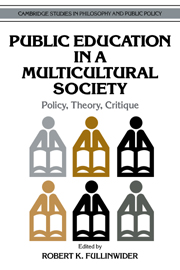Book contents
- Frontmatter
- Contents
- Contributors
- Preface
- PART I INTRODUCTION AND CRITIQUE
- PART II CULTURE AND IDENTITY
- PART III RELATIVISM, REASON, AND PUBLIC EDUCATION
- PART IV TEACHING HISTORY
- PART V TEACHING LITERATURE
- 10 Multicultural literature and civic education: a problematic relationship with possibilities
- 11 Teaching American literary history
- Index
11 - Teaching American literary history
Published online by Cambridge University Press: 05 June 2012
- Frontmatter
- Contents
- Contributors
- Preface
- PART I INTRODUCTION AND CRITIQUE
- PART II CULTURE AND IDENTITY
- PART III RELATIVISM, REASON, AND PUBLIC EDUCATION
- PART IV TEACHING HISTORY
- PART V TEACHING LITERATURE
- 10 Multicultural literature and civic education: a problematic relationship with possibilities
- 11 Teaching American literary history
- Index
Summary
In an essay he published a century ago in the North American Review, Mark Twain attempted to describe how the life of a people finds expression in its literature. The occasion for his reflections was the appearance of a travel book by a Frenchman named Paul Bourget, who had come to the United States for an extended visit two years before. Some reviewers had praised Bourget for the acuity and fairness he brought to his portrayal of America. Yet it seemed to Twain that he had been an oddly credulous tourist, taking every stranger at his word and putting too much faith in the validity of his own impressions. Moreover, once Bourget had drawn what he called “a bundle of sketches from life,” he made the mistake of trying to generalize about the “national character.” Not content to provide an account of American arts and manners, his real hope was to pass beyond them and to capture something he described as “the American soul.”
Quests of this kind were not all that unusual among nineteenth-century literary tourists; Mark Twain, who was a travel writer himself, knew this as well as anyone. Nonetheless, he felt somewhat provoked by what he saw as the effrontery of Bourget's enterprise. A visitor to a foreign land, he noted with some asperity, cannot through observation alone gain access to a nation's inner life; such an achievement requires years of “unconscious absorption” by those who are born to that life.
- Type
- Chapter
- Information
- Public Education in a Multicultural SocietyPolicy, Theory, Critique, pp. 265 - 278Publisher: Cambridge University PressPrint publication year: 1996



